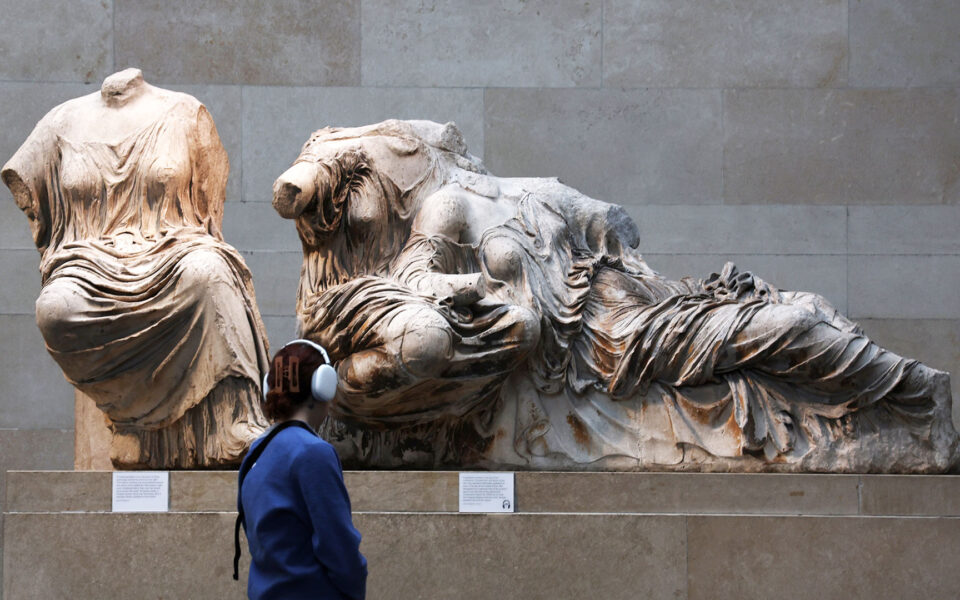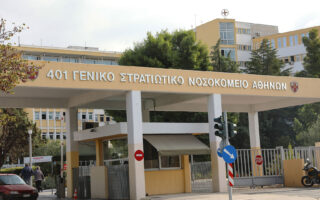In London, the return of the Parthenon Sculptures seems all but inevitable

LONDON – On a cold January morning, Room 18 of the British Museum was bustling with energy as the crowd was marveling at the astonishing collection of Greek sculptures adorning its walls. Amidst the deferential excitement, it was impossible not to discern a murmur among the audience. “Beautiful as they may be, I don’t think they will be here for too long,” a father told his two young kids as they passed the friezes depicting a procession of Athenians. “And honestly, for good reason.”
No major news has surfaced in the past few months, since British Prime Minister Rishi Sunak’s last-minute cancellation of a meeting with his Greek counterpart Kyriakos Mitsotakis in late November reinvigorated a decade-old cultural debate. But today, the sentiment in London is that the return of the 2,500-year-old marble sculptures and reliefs is all but inevitable. For the past five years, British public opinion has consistently sided in favor of their return to Athens, with the latest polls raising the figure of those supporting restitution up to 64%. Most importantly, intense rounds of quiet diplomacy continue to be held between the Greek government and the British Museum, hammering out the details of a potential landmark agreement that would pave the way for the sculptures to return to their origin and be placed in the Acropolis Museum, at the heart of the Greek capital.
It is by no means an easy endeavor, made even more difficult due to the thorny issue of ownership that continues to plague the negotiations and requires a complex legal approach to satisfy both parties. But it is a possibility inching more and more towards reality since 2021 – when talks between Mitsotakis and the museum’s Chair George Osborne began – as a number of variables seem to be aligning, mounting pressure on the British Museum as well as the British government to concede to a deal with Greece.
The precise form of the agreement continues to be shrouded in mystery, but both sides have let slip that it would probably come in the form of a long-term cultural partnership, one which “would also see a rotating selection of Greek artifacts put on display in London,” as a source from the British Museum confirmed to Kathimerini. Even in the best-case scenario for Greece, it seems likely that the marbles would only return as part of an extensive loan agreement, which the Greek government hopes – and the British Museum doesn’t necessarily oppose – could be renewed, possibly indefinitely.
In an exercise where legal formulation meets branding, significant efforts are being made by both parties to keep the agreement’s messaging positive, and the wording around ownership vague enough so that both Greece – which regards ownership over the artifacts as key in any potential agreement – and the British Museum – which is restricted by laws, such as the British Museum Act of 1963, that ban the removal of artifacts from its collection – can come to a consensus.
In the meantime, if there is one thing pushing the deal closer towards fruition it is the British Museum’s leadership, which after a tumultuous year is really hoping to reverse a tidal wave of negative publicity and attract new donor support. “I hope we can reach an agreement with Greece, one that enables these great sculptures to be seen in Athens as well as London, […], that allows other treasures from Greece, some that have never left those shores, to be seen here at the British Museum,” repeated Osborne during the last Annual Trustees’ Dinner, held in the Duveen Gallery where the marbles are currently displayed, speaking of the museum’s goal to forge a “partnership that requires no one to relinquish their claims.”
His statements came after the shocking news that broke in August, which revealed that a staff member had been fired over the theft of potentially thousands of items, most of which were in fact Greco-Roman artifacts, from its storage spaces – a revelation which propelled the museum into a prolonged crisis, leading to the resignation of its director Hartwig Fischer and demolishing its old “safety argument” often leveraged against Greece in the past.
Additional pressures are also at play. The recent initiatives of other museums around the globe to either return artifacts to Greece, as was the case with the Vatican, or to create partnerships that recognize Greek ownership, which happened with the exhibition of Cycladic art that just opened at the Met in New York, are creating a unique precedent for restitution, one that makes it hard for the British Museum’s reluctance to not seem outdated. Meanwhile, the need to step up fundraising efforts for an ambitious pre-planned refurbishment means that the museum must appeal to a new generation of classics-educated potential benefactors, who embrace Greece’s reunification argument.
Paradoxically, though the explosive diplomatic spat that took place in November suggested that the current UK government will not back a potential deal, Downing Street’s impulsive reaction may have also triggered a change in British politics. Sunak’s panicked decision to cancel the meeting with Mitsotakis ended up being widely criticized by all sides of the political spectrum, among others by Osborne himself, a former chancellor of the exchequer for a Tory government, who suggested it was a “hissy fit.” It is a view shared by the majority of the British electorate – a YouGov survey found that 66% of respondents found the cancellation to be wrong, while only 11% agreed with it – and a development which many assess ended up strengthening the Greek side of negotiations.
“I jumped up and down with joy when it happened, because obviously it was a mistake,” recalls Dame Janet Suzman, actress and chair of the British Committee for the Reunification of the Parthenon Marbles, while detailing to Kathimerini her reaction to Sunak’s controversial snub. “I honestly think it is not something he thought about very deeply, it was a surface reaction in reply to an analogy used by the Greek PM on British TV. But it created a tidal wave of publicity for the return of the sculptures, so we were naturally quite thrilled in our organization.”
As much as Greece would like to keep British politics out of any potential agreement, guaranteeing governmental support would make the deal with the British Museum far easier to implement. Herein lies the last factor most probably aligning with Greece’s case – at least very soon. Brits are heading to the polls in less than a year for national elections, and with polls unanimously showing the Tories trailing the Labour Party by unprecedented margins, a change in government seems almost certain. By all accounts, Sunak’s most likely successor, current opposition leader Keir Starmer, will be far more cooperative in the case of the Parthenon Marbles’ reunification.
An insider present at the last meeting between Mitsotakis and Starmer in London described the tone of their conversation as “very amicable” and assessed that, “though it’s unlikely that we will see a public commitment before elections, to avoid any unnecessary backlash, Starmer himself was evidently quite in favor of reunification.”
Sources within the Labour Party also confirmed to Kathimerini that the party “certainly has no plans to stand in the way of a potential deal between the Greek government and the British Museum,” should it be elected to government in the coming elections.
Greece may wish to guarantee Starmer’s instrumental support first, before pushing ahead with an agreement, meaning that a potential deal may not see the light of day until 2025. However, that does not necessarily mean that negotiation partners will stay idle until then.
Breaking his silence on the issue since November, this week Mitsotakis repeated that the Greek government is still in talks with the chair of the British Museum to shape up the deal that would bring the marbles to the Acropolis Museum. “Let me be clear, we will insist on their reunification,” he said in a televised message for the opening of the exhibition “Cycladic Art: The Leonard N. Stern Collection on Loan from the Hellenic Republic” at the Metropolitan Museum of Art in New York.
And though it is now waiting time, and the exact details of the deal are far from set and still kept away from public scrutiny, it is hard not to see that his vision – once a huge point of contention with Britain – is more likely to materialize than ever before.





